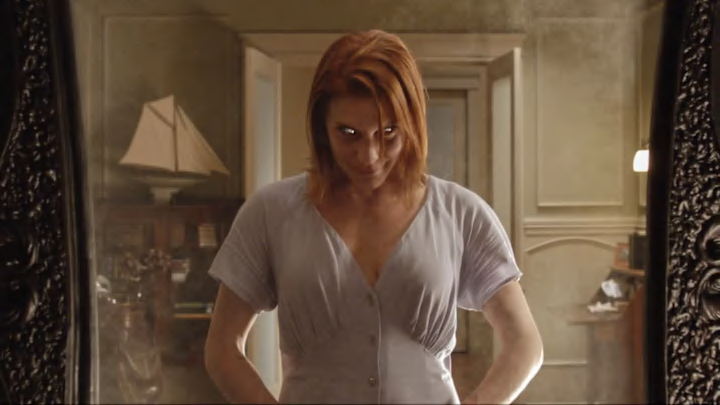Mike Flanagan has directed and written his fair share of films and television series throughout the years, most notably with the Netflix shows The Haunting of Hill House and Midnight Mass, and movies such as the upcoming Stephen King adaptation The Life of Chuck.
While Flanagan has been making movies for several decades now, it wasn't until The Haunting of Hill House and eventual Netflix deal that the director started to become a household name among horror lovers. Nowadays, you'd be hard-pressed to find a horror fan who hadn't seen most of, if not all of, his filmography.
Still, sometimes his earlier films get overlooked, titles like Hush, Ouija: Origin of Evil, and the subject of this article, Oculus, are forgotten in favor of his newer works. But Oculus remains one of Flanagan's finest projects to date.
The story was derived from Flanagan's 2004 short film Oculus: Chapter 3 - The Man with a Plan. Flanagan directed and co-wrote the film with Jeff Howard. It follows a pair of adult siblings, Kaylie (Karen Gillian) and Tim (Brenton Thwaites), as they try to solve the mystery of an antique mirror called the Lasser Glass. Kaylie suspects the mirror might have somehow caused their parents' earlier demise, unaware that the object harbors something evil that can impact anyone who stares into its reflection.
Poor Tim gets quite the wake-up call at the start of the movie when he checks out of a psychiatric facility and is immediately greeted by his sister, who is eager to understand the tragic and violent deaths of their parents. The story alternates between the current timeline with the adult siblings, and 11 years into the past, as we learn how their parents, Alan (Rory Cochrane) and Marie (Katee Sackhoff) came to be influenced by the Lasser Glass.
Many horror films have featured mirrors and their innate eerieness throughout the years, they're a powerful symbol and easy way to manifest a sense of uncanniness in viewers and characters alike. But Flanagan's film excels at creating a strong balance between the emotional drama he's known for and the downright terrifying nature of the Lasser Glass.
Some viewers might have walked away frustrated by the movie's ambiguous nature and the lack of explanation regarding the actual Lasser Glass, but I think that is what makes Oculus such a frightening and taut psychological movie.
I found an interview Flanagan did with Den of Geek back in 2014 where he discusses his decision to forgo explanations in favor of disturbing imagery and careful characterization. He cites H.P. Lovecraft as an inspiration in that regard. Lovecraft enjoyed keeping readers in the dark, obscuring the source o f horror and suggesting that the average mind could not understand the real horror. That is a key part of what makes the unknown so terrifying. Not just the knowledge that we don't know what something is, but that if we did try to figure it out, it could drive you insane.
Flanagan says to explore another "world beyond the veils of ours that defies understanding and doesn't need a backstory," it's the kind of thing that could drive you to insanity trying to grapple with.Lovecraft plays with that a lot in his stories, creating ancient beings and eldritch monsters that cannot even be fathomed by an ordinary human.
Oculus might appear like a simple concept on the surface, the story of a haunted mirror. But once you start watching it, you can tell there is a lot more going on beneath the surface and the story lingers in your mind for days, especially every time you pass a mirror in real life...
Oculus is currently streaming on Prime Video and also available on physical and digital.
